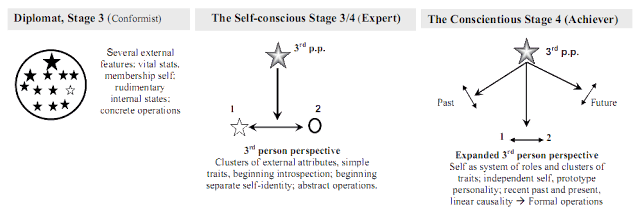 |
| Web comics from the excellent xkcd.com |
Experts have grown out of the Diplomat action-logic, they have an increased capacity for 3rd person abstraction and for seeing multiple alternative solutions to a problem. What better capacities can you expect from a tech guy? Whereas Diplomats are more likely to sugar-coat reality, Experts can more easily accept an imperfect present - and be cynical about it. This is in part because they can better see what could be in addition to what should be, and they identify with an ideal self and an ideal world that seem reachable. So why stick around with the crowd if they can strive for individual improvement, mastery, or even perfection?
 |
| Adapted from Detailed Descriptions Of The LDF Action Logics, Cook-Greuter, 2005 (pdf) |
That's why I suspect that computer engineering must attract a great deal of Experts. What better field than one where you get to define the rules of the reality you navigate? Is there a more perfect operating sys... world? Add to this picture the general public that considers all those hackers like little geniuses, and try not getting caught in an Expert superiority complex after that. Because yes, they can be annoying too:
Severe criticism of how another thinks is a common form of intellectual aggression at this [action-logic]. A sense of superiority is not very well hidden. ... While Diplomats try to suppress aggression for the sake of acceptance, it now reemerges. Experts often have a hostile sense of humor. Ridiculing others is a common sport. (Cook-Greuter, 2005, p.15-16)
It's also precisely where the limitations of the Expert mindset reside. They will strive for improvement within a system of rules but will resist changing the rules themselves. They get the ultimate ego-boost from achieving mastery in a specific field, so feedback from the outside is threatening: what if you realize the measuring standard of your self-worth is flawed since the beginning?
Yet they are in a catch-22 position regarding self approval. They don't yet have the Achiever's (p.16-20) ability to define their own standards of self-evaluation (so as to not fear social disapproval), yet they know better than fully adopting others' standards, like Diplomats would. In essence, they need their peers' approval of their difference - i.e., being the best at ________ (fill in the blank).
 |
| From Making the case for a developmental perspective, Cook-Greuter, 2004, p.6 |
Before hordes of geeks jump at me, of course I'm not saying that hackers = Expert action-logic. It's a generalization. However, in my experience the Expert hacker does exist, it's not that rare. I certainly went through a phase in my life when my ego had a similar flavor to that of Expert, and I did dream of being Kevin Mitnick, and I did watch War Games hundreds of time fantasizing on the power to launch a global thermonuclear war. I really thought I had it all figured out. Does it ring a bell to you?
- Detailed Descriptions Of The LDF Action Logics, Cook-Greuter, 2005 (pdf, 34 pages)
- Skeptical about developmental psychology? It's a good sign, but you can also read Cook-Greuter's article, Making the case for a developmental perspective (pdf, 9 pages)
- An interview with Robert Kegan, another developmental psychologist, in EnlightenNext magazine (2002)
- The Developmental Observer blog